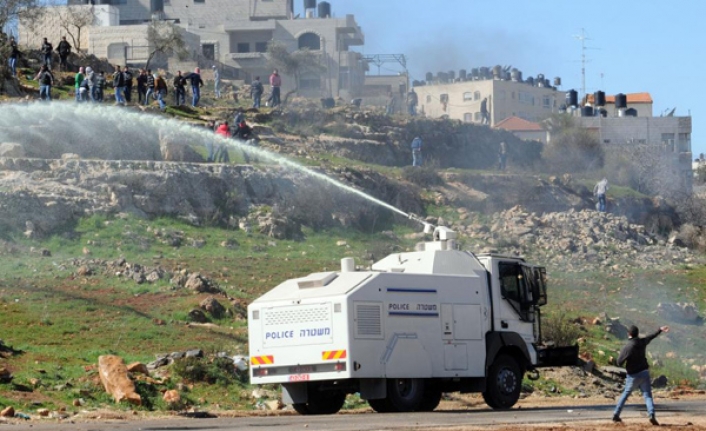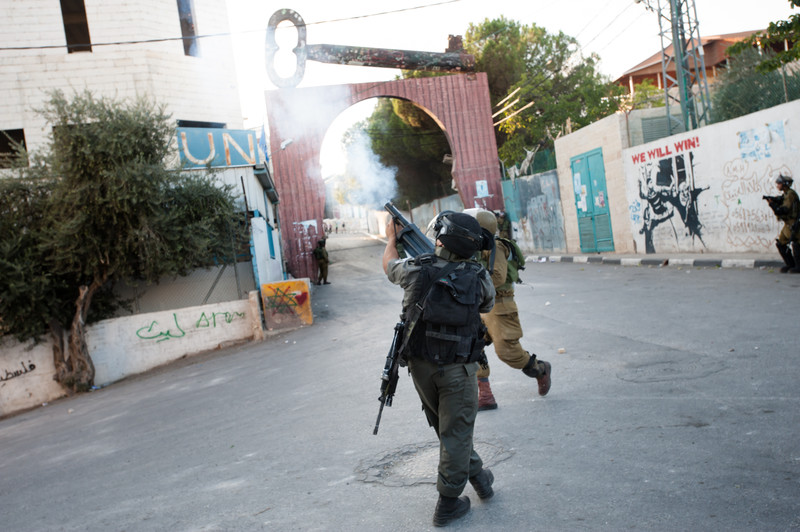Originally published on Ma’an News Agency on June 27, 2014.
BETHLEHEM (Ma’an) — Rubhiya Abd al-Rahman Darwish was taking a nap on the couch of her family home on Sunday when she was awoken with a start by the sound of shattering glass.
“I saw a burst of water breaking through the window, when suddenly an intense odor hit and I passed out from the smell, so they had to take me to the hospital,” the 75-year-old woman told Ma’an during an interview in her small apartment in Bethlehem’s Aida refugee camp.
Although she is used to Israeli soldiers throwing tear gas canisters into the alleyway beside her home, Darwish was surprised to find that this time they had come with a cannon to hose down the sides of local homes with putrid-smelling water.”
I went to the hospital and they gave me a shot, but the poison started coming out of my mouth and nose. I started screaming because my back was hurting, and it hasn’t stopped,” the elderly woman, who said she suffers from diabetes, hypertension, and a heart condition, told Ma’an.
“All my clothes were ruined, and we had to throw all the quilts and mattress out,” she said.

“Why do they do this to us?”
Locals say that the daytime attack on their homes was completely unprovoked and unexpected, and many expressed shock at the fact that Israeli forces had covered the camp in a layer of an unknown, repulsive substance.
Known as “Skunk,” the Israeli military has been using the chemical since at least 2008 as a form of non-lethal crowd control. Palestinians, however, simply call the liquid “shit,” after the smell that can stay for weeks on clothes, body, walls, and furniture.
An Israeli military spokesperson contacted by Ma’an did not return a request for comment on Skunk’s chemical makeup, or on the purpose of the raid. However, Israeli human rights watchdog B’Tselem says that the military has in the past said that the substance is organic, although it has not divulged its ingredients.
A B’Tselem report on Skunk also confirmed the recurrent usage of the substance — which causes nausea and vomiting, especially among children and the elderly — against Palestinian homes, “raising suspicions that the Skunk is being used punitively against villages where regular weekly demonstrations are held.”
Near the camp, on what used to be the main Hebron-Jerusalem road but is now cut off by the Israeli separation wall, a large water cannon was even installed earlier this year beside a military tower to spray the water at locals, highlighting how quickly Skunk has been integrated into the Israeli army’s arsenal.
Salah Ajarma, the director of a nearby cultural center, said that a group of children had been walking about fifty meters from where the separation wall cuts through the camp when Israeli soldiers started firing tear gas canisters at them.
“The soldiers then came down and followed the kids,” Ajarma told Ma’an during an interview at his office at the Lajee Center, “and as we stood watching from the center with a group of visiting foreigners and journalists, the soldiers began cursing vile words at us and at the children in Arabic, to make sure we understood.”
In the week before the attack, Israeli soldiers had thrown tear gas canisters at groups of children when they gathered near the center after morning exams ended, and so Ajarma said he was expecting the usual threats again on Sunday.
“I was surprised, though, when the soldiers came back with a big vehicle with a pump on top of it and they started spraying everything with a chemical substance with a terrible smell,” he said.
“They weren’t trying to hit the protesters, there weren’t even any protesters in the street! They shot at the homes of people and into their windows, regardless of whether they were open or closed,” he added.

After the raid, residents emerged from their homes, horrified to find the alleyways and homes of the camps covered in a foul-smelling coat of liquid. For the next few hours locals attempted to clean it up, and while they managed to get rid of the worst of the smell, when a Ma’an reporter visited the scene three days later, the smell still hung heavy in the air.
“People don’t even know what the substance in is in order to clean it,” Ajarma said, “and we do not know what the chemicals are made of. We tried to clean it with chlorine but there was a chemical reaction, giving off an even more killer smell,” he added.
Noting that this is the third time the army has sprayed Skunk in the camp, Ajarma said that in the winter the smell had stayed for 10-15 days, and a row of trees hit by the water had since shriveled up and died.
“This chemical could have effects that we don’t know about, on the nature in the camp, and on the future generations,” Ajarma worried.
Nidal Al-Azraq, a volunteer at the Lajee Center, told Ma’an that the soldiers were “having fun” throughout the raid, mocking residents as they shot the cannon into homes and even taking pictures of themselves beside it.
“There was a dog above one of the walls on the street where they were spraying houses, and so they aimed at it and started shooting the water,” Al-Azraq said.
“After almost hitting it twice, the dog started barking, and on the third time the soldiers hit the dog straight on with the water cannon and they all started laughing,” he added.
Al-Azraq said that although he was unsure of the purpose of the Israeli raid, he believed that they had done it in order to pressure residents into stopping protesters in the camp, who often throw rocks at the Israeli soldiers stationed nearby.
“They win sometimes, and people get mad and tell the protesters to stop,” Al-Azraq told Ma’an.”But other people reject this pressure and say: ‘What does it mean to hit us with this kind of stuff?’ It’s not just an insult, it’s as if we’re not even human beings!”
Al-Azraq said that many people, however, were resigned to such attacks by military forces.
“It’s useless to say that this is against our human rights, because that is not a language that Israel knows. What use is it to ask why they do this to people?”
Darwish, the 75-year-old woman who passed out after soldiers sprayed the putrid-smelling water into her window, expressed her resignation at the repeated Israeli attacks on her home.
A refugee originally from the village of Malha near Jerusalem, Darwish was forced to leave her home with her family when Zionist forces came and expelled them from the town in 1948.
“Where should we go?” she asked, sitting on the couch of her small apartment as she looked up at the roughly-patched up window broken by the water cannon.
“They kicked us out of our homeland, and what are we supposed to do? Where are we supposed to go?”